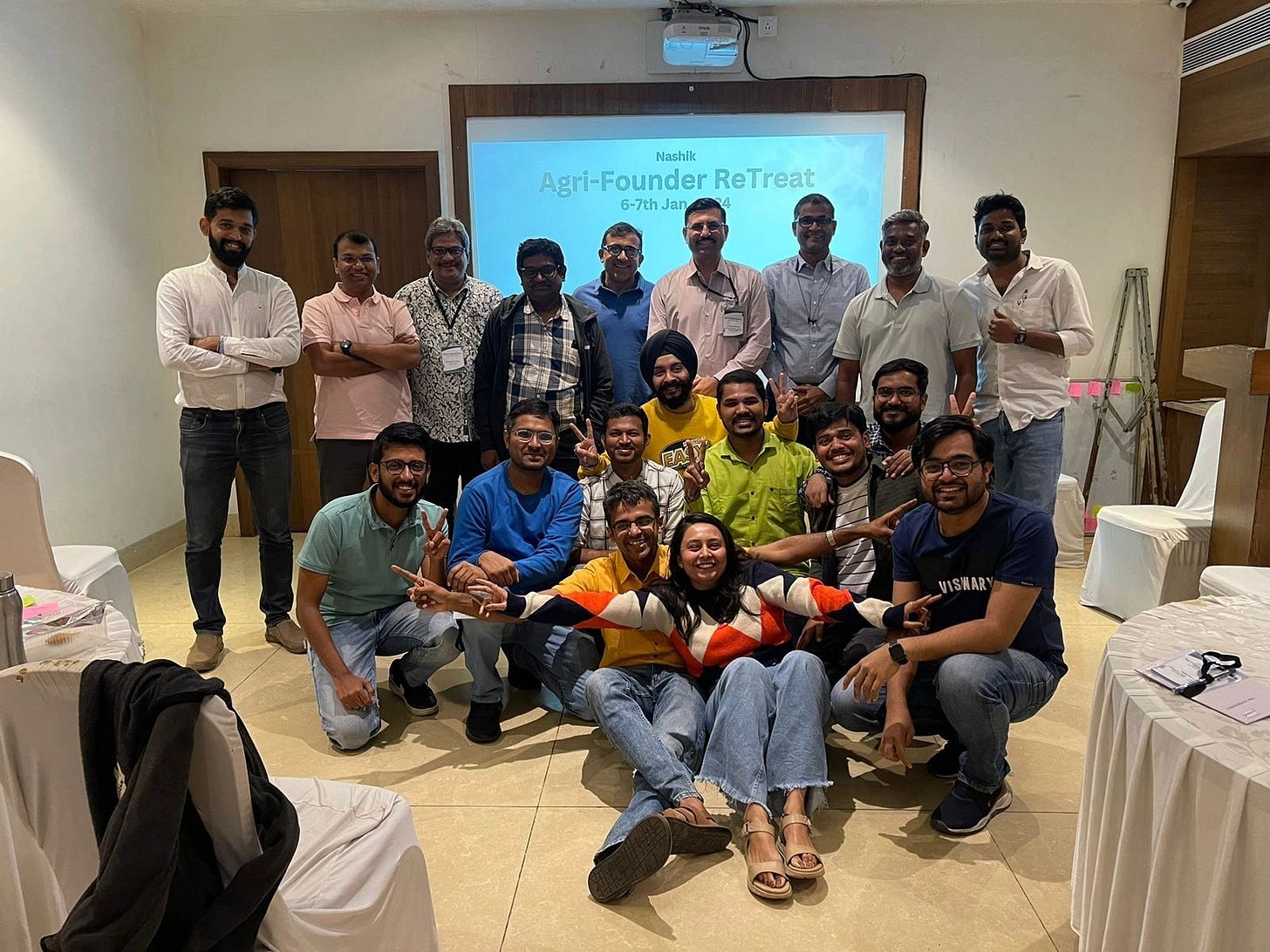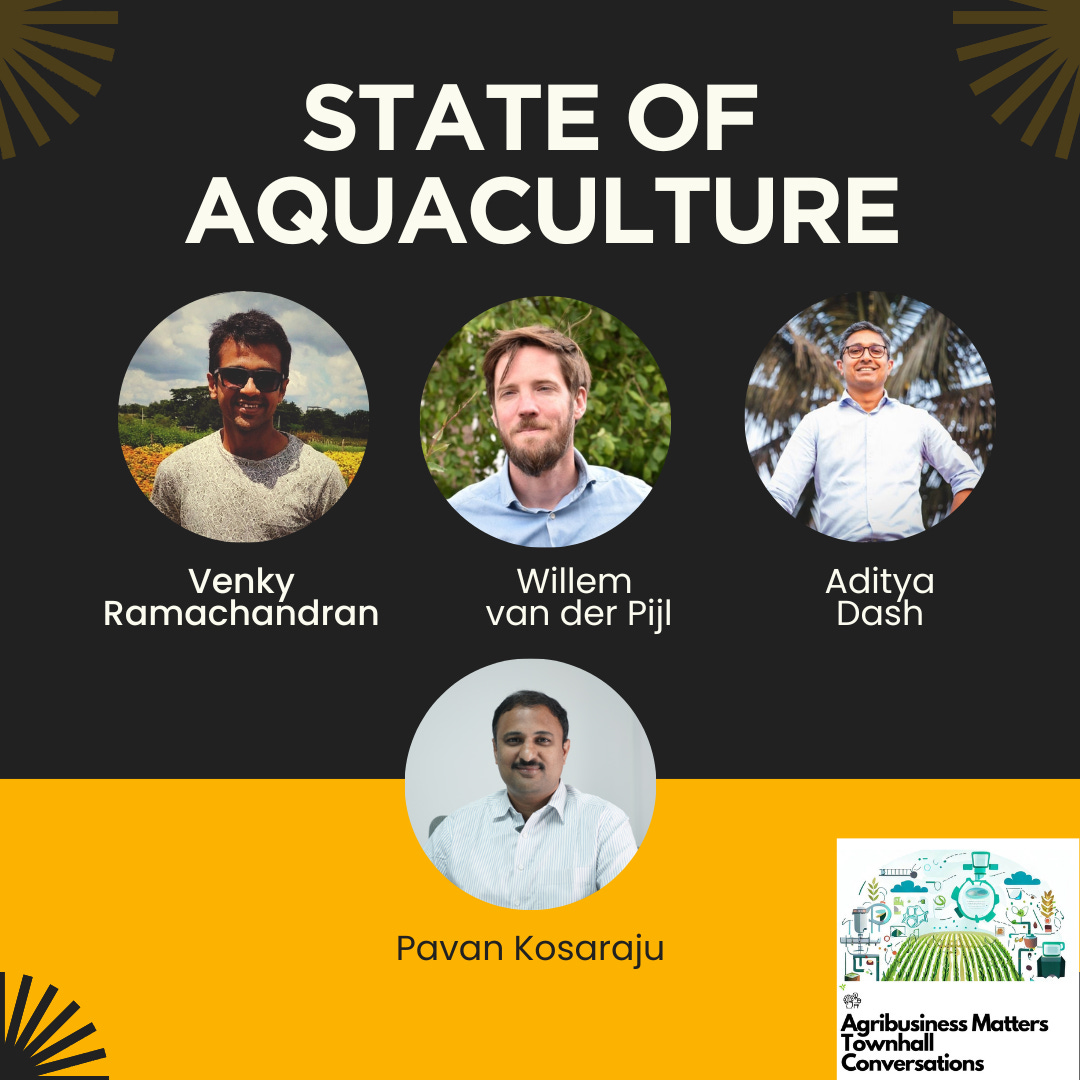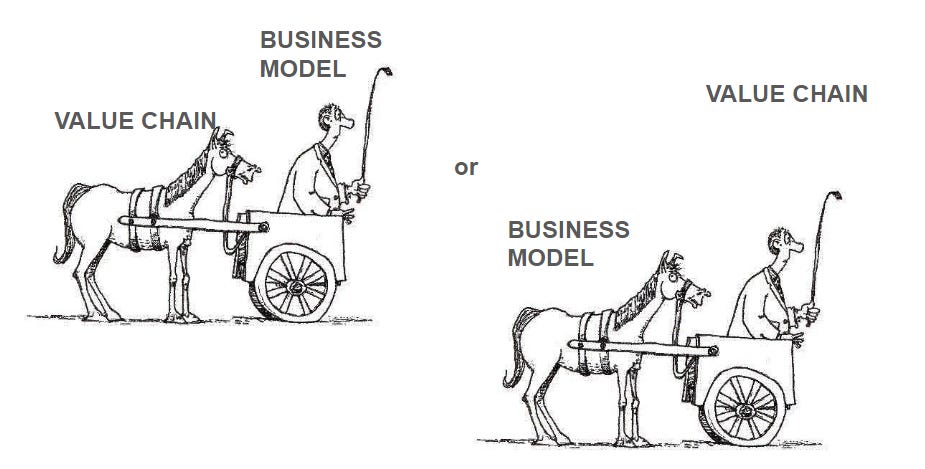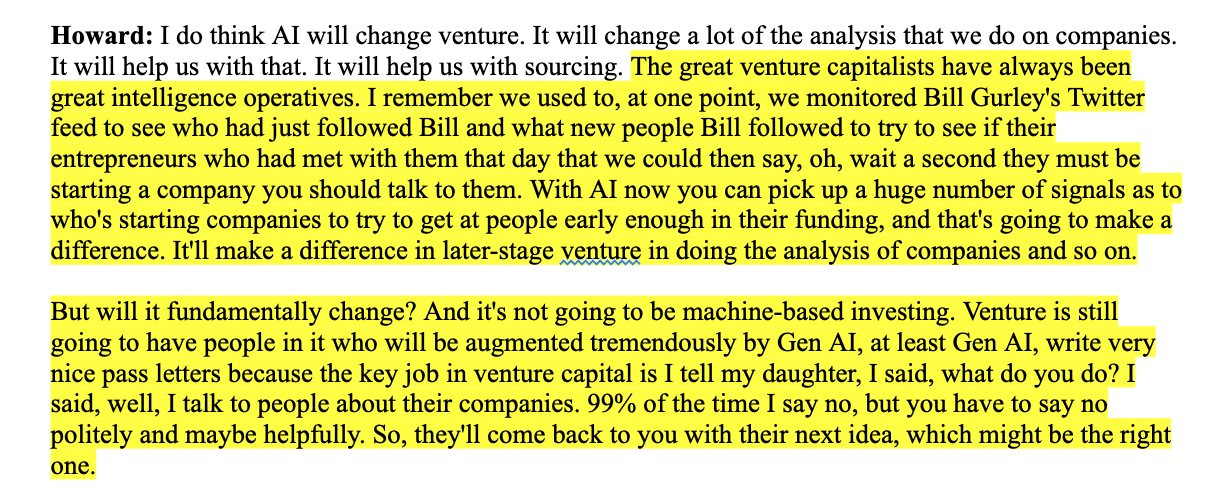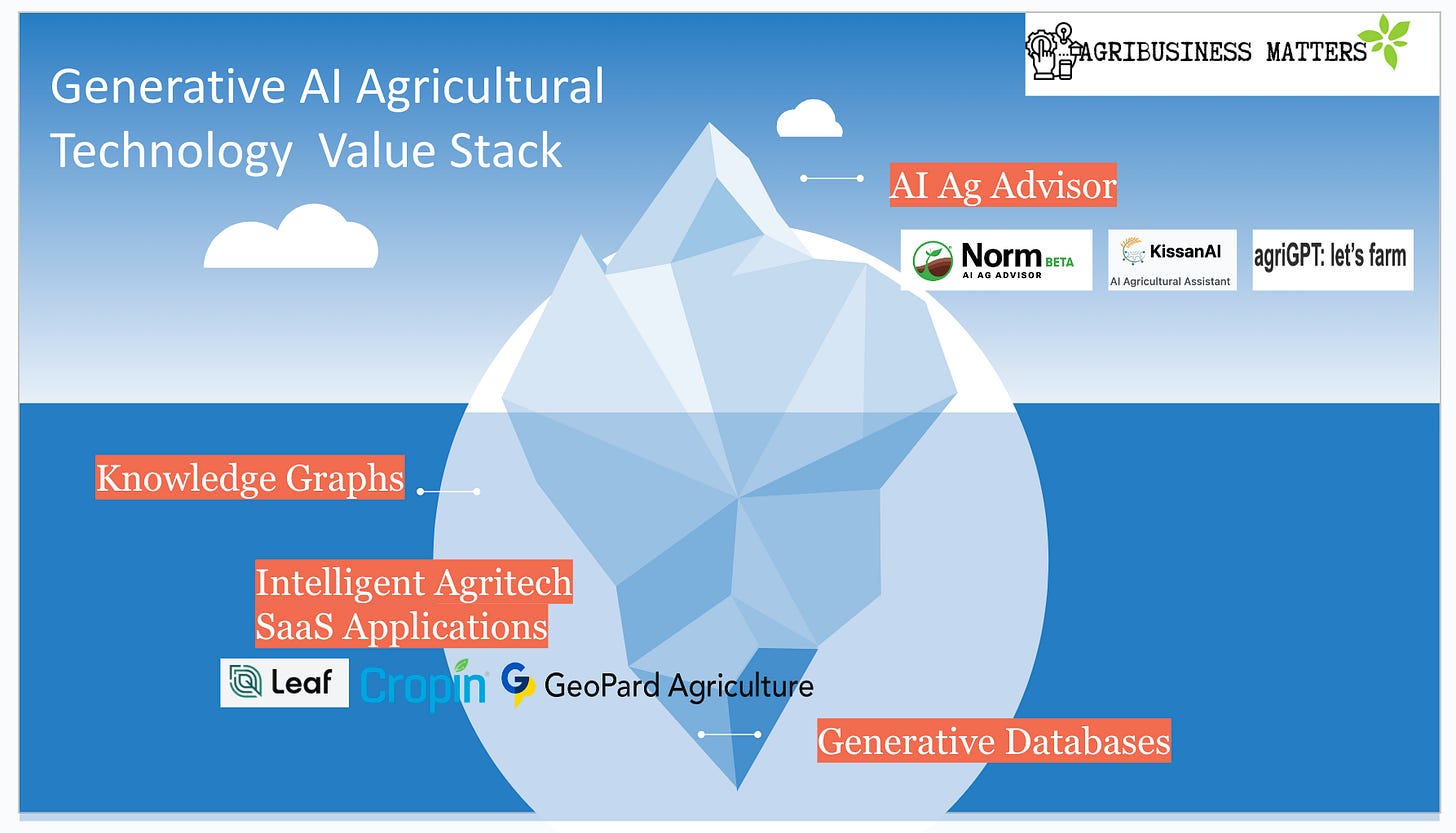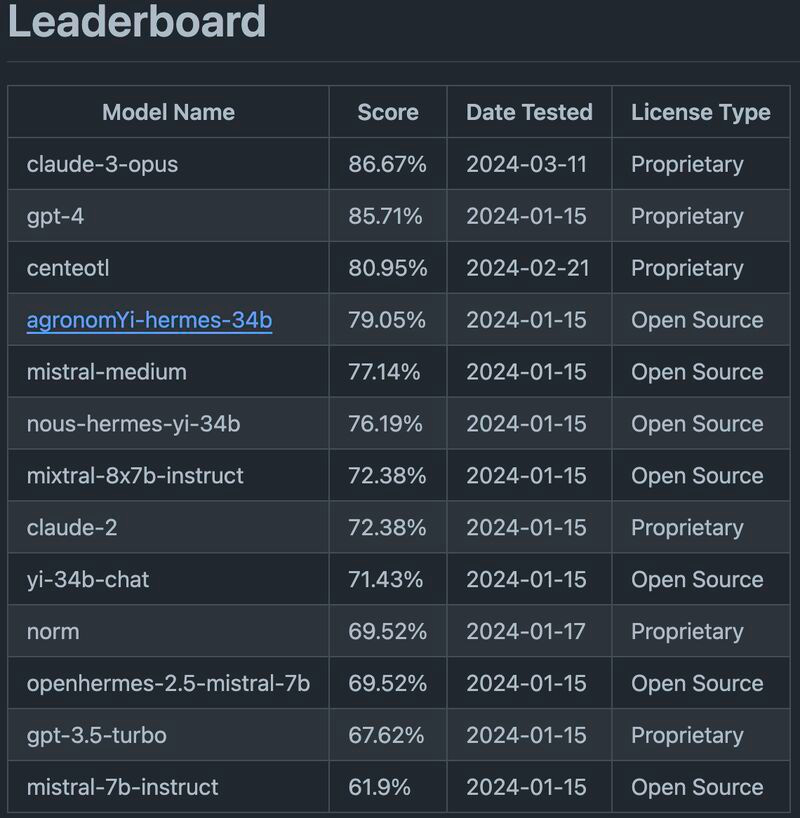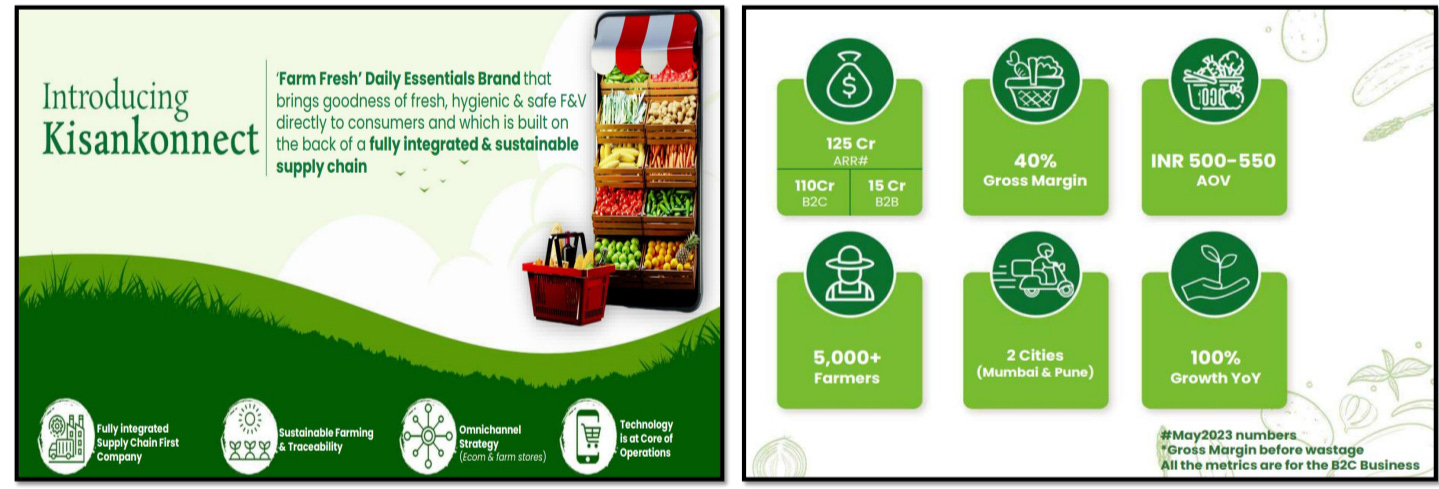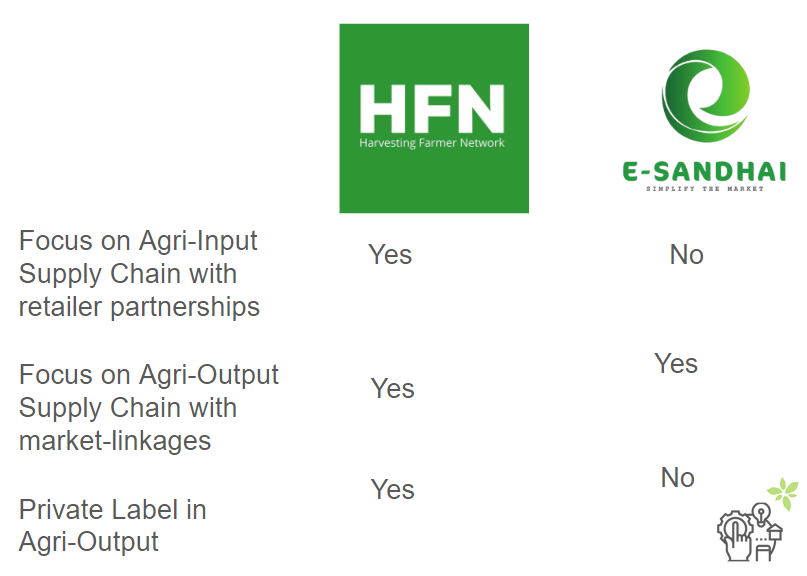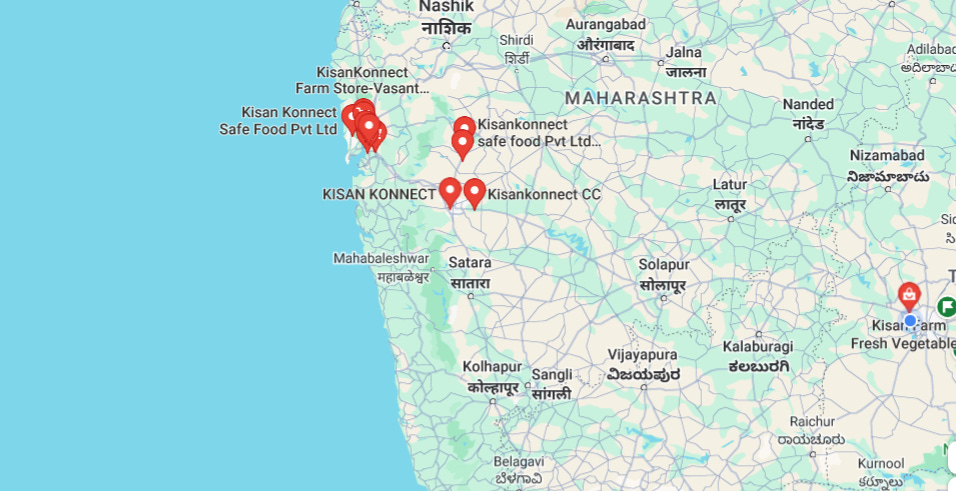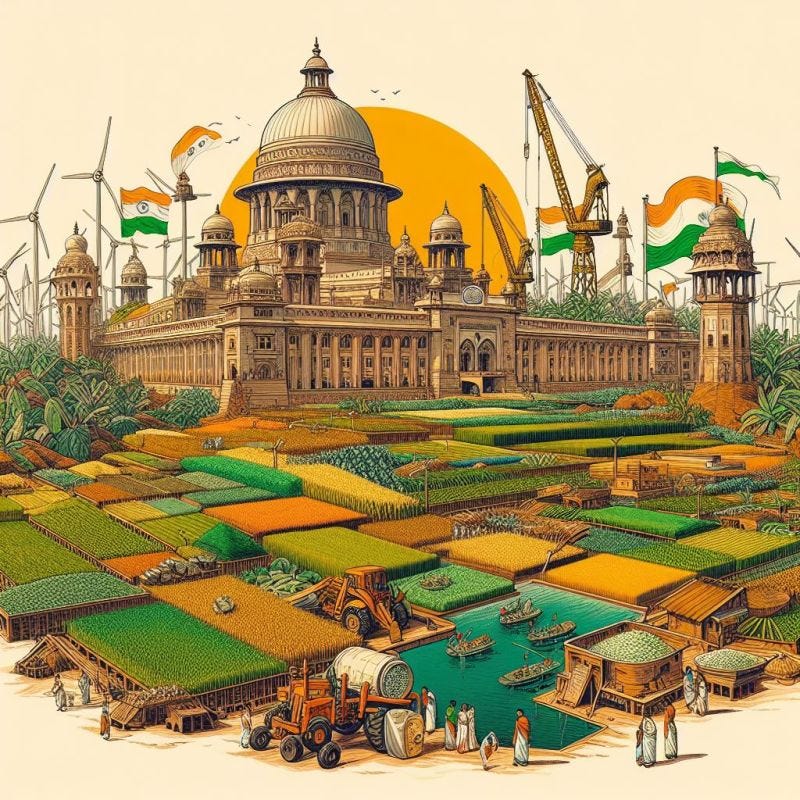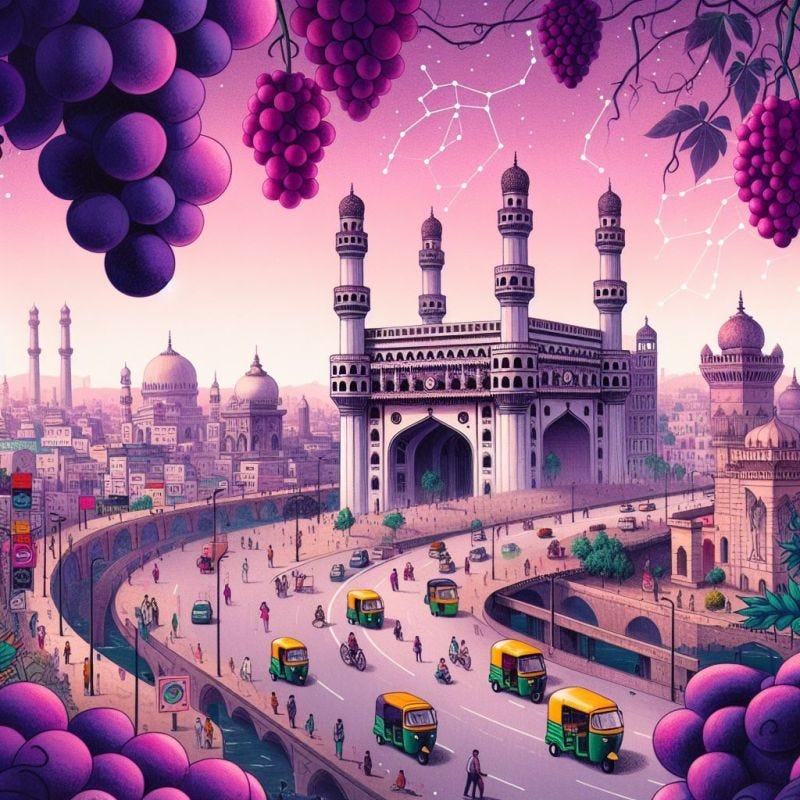Everything Everywhere All At Once

State of Agritech - 24th March 2024
Invitation to join the second edition of Agri-Founders Retreat
We are planning the second edition of the Agri-founders Retreat on May 11th-12th in Bangalore, focusing exclusively on building marketplaces. A few of us in the Indian agritech ecosystem conducted the first agri-founders retreat in the grape city of Nasik in January and honestly, we were quite floored by the positive response we received.
The challenges faced by agri founders are quite different from other founders. We are dealing with a sector that is slow to change for good and bad reasons. We are also dealing with a more diverse range of players and forces within and beyond our control. With the tailwinds of digital public infrastructure and the emergence of protocols, digital agriculture adoption will inevitably scale up and marketplaces will become a fixture in the ecosystem. The objective of the founders' retreat is to exchange notes between those building marketplaces and serving marketplaces and see where we could collaborate.
Unlike other sectors, the market is insanely large enough to accommodate a variety of players. When I announced the last retreat, many friends outside India also wanted to join us. I hope there is adequate time for you to plan the trip. No matter which country you are from, if you have the budget to make a trip to Bangalore, do consider applying. We are inviting those building a marketplace and those serving a marketplace. If you have any questions, feel free to ping me.
ABM Members’ Corner:
Upcoming ABM Townhall: State of Aquaculture - April 2nd
In this edition of ABM Townhall, Pavan Kosaraju (AquaExchange), Aditya Dash (Frozen Shrimp Exporter), and Willem van der Pijl (Shrimp Insights) join us to survey the State of Aquaculture.
// Sorry for doing it as a manel!! If you know any women from the world of aquaculture whom I should talk to, do let me know.//
We plan to delve into mental models to grapple with aquaculture sector dynamics vis-a-vis agriculture; what India can learn from Ecuador; how to strengthen India’s Blue economy and a lot more. Members can RSVP here
March ABM Townhall Videos on State of Soil Testing and Designing Games for Sustainability have been uploaded to the ABM Townhall Digest page.
Ministry of the Future
01/ Dark Value of AI in Agritech
In an era of plough, hoe and tractors, value was bright enough to see and largely unambiguous. In an era of data, algorithms and AI, value becomes abstract, restless, emergent and wild. Value becomes dark.
02/ When Dhanuka Met Kisankonnect
Speculating over Dhanuka's 10 crore investment into Kisankonnect, an agritech startup that offers farm-to-home services for fruits and vegetables.
Ministry of Geopolitics and Hunger Games
03/ Viksit Bharat, Viksit Krishi (Developed India, Developed Agriculture)
In 1965, when India's Prime Minister Lal Bahadur Shastri proclaimed "Jai Jawan Jai Kisan" (Hail the Soldier, Hail the Farmer), it galvanized the nation reeling in turmoil. Is it time to proclaim 'Viksit Bharat, Viksit Krishi' (Developed India, Developed Agriculture)?
04/The lost city of grapes
Hyderabad was once called the city of Grapes. What happened to the city and its grapes?
A Quick Word from ABM Sponsors

<Announcement: Applications open for the third Cohort of Global Agritech 101>
One of the games we play in Session 2 of the course with contrasting case studies is this. Which one is correct? How do you decide which one becomes the cart and the horse? A Business Game: For 1 to n players / Ages: 21 to 75
Third Cohort - April 20th-27th-May 4th - 8 PM -10 PM IST- Available on Stripe here for those outside India and Razorpay here for those inside India for registration.
01/ Dark Value of AI in Agritech
In an era of plough, hoe and tractors, value was bright enough to see and largely unambiguous. In an era of data, algorithms and AI, value becomes abstract, restless, emergent and wild. Value becomes dark.
I’m not the first to talk about the concept of Dark Value. However, with the age of AI, we are taking dark value to the next mind-bending level possible.
Take the case of “AI for venture investing” possibility articulated by Howard Morgan, the Godfather of Venture Investing in a recent podcast.
Yes, AI will fundamentally transform venture investing. But the signals that the AI will pick beside humans as to who is starting the next big agritech firm and figure out the right set of people early enough in their game will remain a powerful source of “dark value”.
Let’s talk in native agritech terms.
As I spelt in detail in my Generative AI Agritech Value Stack, every agronomist will have their own AI as a user interface. Pay attention to the dark value at the bottom of the iceberg.
But the story doesn’t end there.
What will differentiate the wheat from the chaff (the pro agronomist from the ordinary) is the ability to grok data through direct perception (human observation and deep training data sets stored in hands, nose, ears and fingers) AND indirect perception and more importantly the difference between the two.
AI will not make agronomist’s jobs obsolete.
It would rather be a powerful Swiss knife tool for the agronomist who knows when to rely on direct perception and when to rely on indirect perception involving data (synthetic, real, live), algorithms, and artificial intelligence.
Agribusiness Matters Member Bailey Stockdale, CEO of Leaf Agriculture, has been maintaining a Leaderboard of Agronomy LLMs, and as expected by the results happening outside agriculture, Claude-3 has been leading the pack.
Although it might seem as if proprietary models are winning over open-source LLMs, I am confident that Open-source LLMs will win the long infinite game provided the following will happen.

Currently, what makes me bearish about AI is its humongous energy and water costs. I hope we discover energy sources that make the cost of computing cheaper.
02/ Understanding Dhanuka’s Investment into KisanKonnect
Direct-to-farmer models have been picking up steam and going by these unverified numbers, they show a lot of promise.
In Nov’23, I profiled and detailed out agritech strategy of direct-to-farm trade commerce players eSandhai and Harvesting Farmers Network.
Going by this, it is quite obvious that KisanKonnect, HFN and other direct-to-farmer commerce players will eventually become distributors that will distribute biologicals to farmers directly.
Globally, what is fascinating to observe in the world of biologicals is that the product violates some of the channel norms meant for an older paradigm of agrochemicals. And so, we can expect direct-to-farmer players to become distributors of biologicals based on the tropical and temperate weather conditions of the market they are serving.
Take the case of KisanKonnect. When you overlay the map of their farm stores and the soil profiles, you will figure out what biologicals to distribute.
Maharashtra has largely sodic soils. And so you can plan your distributorship accordingly, based on the profile of the biological products.
Ministry of Geopolitics and Hunger Games
03/ Viksit Bharat, Viksit Krishi (Developed India, Developed Agriculture)
In 1965, when India's Prime Minister Lal Bahadur Shastri proclaimed "Jai Jawan Jai Kisan" (Hail the Soldier, Hail the Farmer), it galvanized the nation reeling in turmoil. Is it time to proclaim 'Viksit Bharat, Viksit Krishi' (Developed India, Developed Agriculture)?
What would a blueprint for 'Viksit Bharat, Viksit Krishi' look like? I am in the middle of putting together a document on this. Albert Einstein famously once said, "If I had an hour to solve a problem, I'd spend 55 minutes thinking about the problem and 5 minutes thinking about solutions".
Many moons ago, French Economist Bruno Dorin summed up Indian Agriculture neatly in five equations without caricaturing too much the complex domains of food, food security and productivity in agriculture.
a) Food = Wheat + Rice.
b) Productivity = Irrigation + Fertilizers
c) Food Security = Public Procurement + Redistribution.
d) Employment =Small Firms
e) Subservience = Imports + Foreign Capital
How do we change these essential equations defining Indian Agriculture? Let us review a few key facts that could give us a better bird's eye view:
1) The share of agriculture in the total Gross Value Added (GVA) of economy has declined from 35% in 1990-91 to 15% in 2022-23. However, India is experiencing "a reverse structural transformation" with more people returning to Agriculture (45.5 % of the Workforce as per PLFS 2019) instead of exiting agriculture.
2) India has more part-time agriculturists (100 Mn) and less full-time growers (50 Mn). Monthly Agricultural Household income, as per NSSO 2019 data is 10218 INR.
3) Socio-economic sustainability and water sustainability are bigger concerns in India than soil and ecological sustainability (From 2024 ICAR-NIAP Paper on Spatial Assessment of Sustainability in Indian Agriculture). This correlates with other data points that point out that Groundwater dominates India's minor Irrigation landscape with a 94.8% share’
4)Indian Agriculture policies have historically been biased towards irrigated over rainfed regions and created vast inequality of incomes. Rainfed farming accounts for 55 per cent of the net sown area (139.42 M ha), and 61 per cent of India’s farmer population.
5) Women dominate Indian Agriculture. According to 2020-21 PLFS data, 62.2% of total women workers (100 million), as against 40% of total men workers, (151 million) were employed in agriculture.
6)The share of public expenditure on agriculture has been declining ‘from 11 per cent to 9.5 per cent between 2010-11 and 2019-20, with a CAGR of -1.65 percent’ (FAS Data on Public Spending in Agriculture)
Given all of these, how would a blueprint for 'Viksit Bharat, Viksit Krishi' look like? I will delve into this further in the coming days. Do share your thoughts and perspectives.
04/ The lost city of grapes
Hyderabad was once called the city of Grapes. What happened to the city and its grapes?
Let's not forget. Hyderabad created the world record in grape production of 42 tons of Anab-e-shahi per acre (105 MTs/ha) in 1969.
//“This was described as a spectacular yield and a biological wonder by Dr.H.P.Olmo, a renowned Viticulture Scientist of the world (Chadha K.L.1992)”//
What happened to the city that once created the necessary climate for farmers to perform this 'biological wonder'? What happened to the grapes of the city?
Cultivation came down drastically ‘from 10,000 acres in the 1990s to just 5,000 acres in 2008 and currently stands at 750 acres in Telangana’ as grape growers found it profitable to join the real estate drive, fueled by the State’s earnest effort to make sure that Hyderabad’s real estate market remains attractive for investors, even if it means challenging the barricades put in place for environmental concerns.
Few weeks back, I took my son to the grape festival. We plucked grapes and talked about the history of the grapes. I couldn't help but feel a lump in my throat at the sad state of grapes in these regions.
Did we lose grapes because Hyderabadis lost their sense of pride over the grapes? I am not a native Hyderabadi. But, I have developed feelings for the city over time. Honest question. Other than hopelessly overstated myths about Biriyani in these regions, do we have anything else to pride ourselves in?
Had Hyderabadis retained even a glimmer of pride over its grape varieties, could we have overtaken the irrevocable wheels of destiny? With all due love to my grape growing grower friends and grape-selling business entities, why is nobody sad when Anab-e-shahi is losing out to Thompson seedless varieties?
Today, people who come to Hyderabad come to the flashy part of town and pose for selfies in front of IKEA. In an alternative universe in which Hyderabadis were proud of their grape varieties, how would that city look like?
Would the grape growers around the city conduct mesmerising grape tours, seducing us with different varieties of grape wine? Would international buyers be raving about Anab-E-Shahi grapes, whenever they enter the grape wine counter at Hyderabad Airport?
What can give us hope about the future of grapes in the city of grapes?
So, what do you think?
How happy are you with today’s edition? I would love to get your candid feedback. Your feedback will be anonymous. Two questions. 1 Minute. Thanks.🙏
💗 If you like “Agribusiness Matters”, please click on Like at the bottom and share it with your friend.


